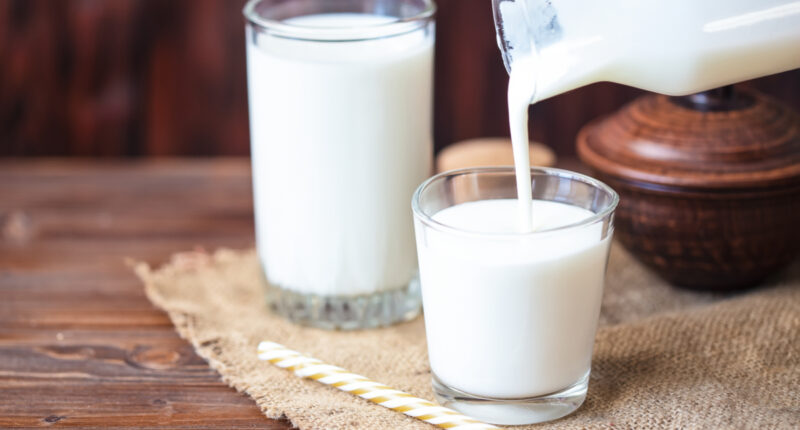8 Best Breakfast Foods for Your Gut Health, According to Dietitians – There’s a reason why breakfast is often referred to as “the most important meal of the day.” It helps keep you fueled and energized, promotes steady blood sugar, and has also been found to boost cognitive function. However, regularly eating breakfast can be easier said than done, as figuring out where to start or—more specifically—what healthy breakfast foods to choose can be somewhat daunting, especially if you’re hoping to consume the best breakfast for a healthy gut.
Your gut health plays an integral role in your overall well-being, with the trillions of microbes lining your digestive tract playing several different roles. These range from helping with digestion and facilitating the absorption of minerals to communicating with your immune system and triggering mood changes.
To help you better kickstart your day, we consulted several dietitians who shared their go-to gut health-promoting breakfast foods. Here’s what they had to say about the best breakfast for a healthy gut you can eat—and for more healthy eating advice to help you make the most out of your wholesome morning meal, be sure to check out 7 No-Equipment Exercises Men Should Do Every Day
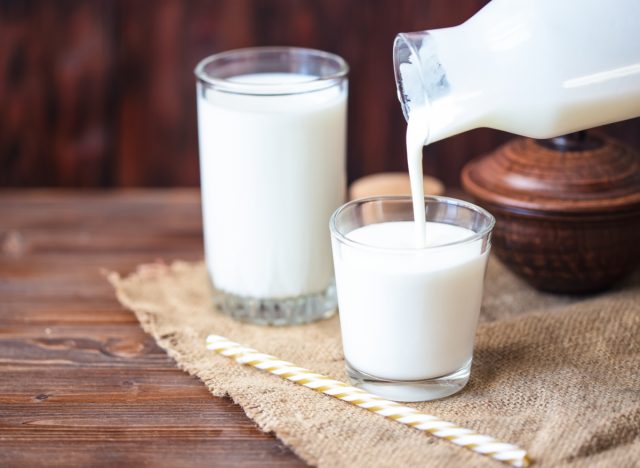
If you’re looking to shake up your go-to breakfast smoothie, adding kefir to it is one way you can boost your gut health.
“Kefir is a fermented dairy drink that contains live bacteria to support a healthy gut microbiota,” says Lauren Manaker, MS, RDN, LDN, CLEC, CPT.
While similar to yogurt, kefir has been found to contain three times more probiotics than regular yogurt. According to a review in Frontiers in Microbiology, probiotic foods can alter the gut microbiota by introducing new species or strains into the gastrointestinal tract. They can also promote the growth of beneficial microbes that are already present.

Whether sprinkled over oatmeal, mixed into yogurt, or added to smoothies, walnuts are a versatile ingredient that can be used to elevate your breakfast and support a healthy gut.
“A study found that walnut consumption was associated with positive changes to the gut microbiome,” Manaker says. “Specifically, those who ate 42 grams of walnuts each day for three weeks experienced a decrease in secondary bile acids, which may play a role in colon cancer, inflammation, and gastrointestinal diseases.”
Additionally, Manaker points out that the study found that eating walnuts yielded an increase in “good” gut bacteria.
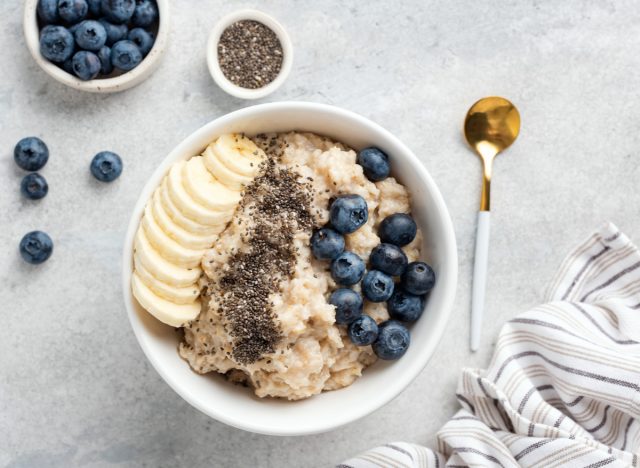
Oatmeal is celebrated for its numerous health benefits, such as lowering LDL cholesterol and controlling blood sugar. Therefore, it’s no surprise that it can have a positive impact on your gut, as well. Oats, especially steel cut and rolled, provide one of the highest sources of beta-glucan, a fermentable soluble fiber. This fiber can help promote the growth of healthy bacteria, such as Bifidobacterium, which can help stimulate the immune system.
“Be sure to consume oat and oat products with little to no added sugar,” says Molly Hembree, MS, RD, LD.
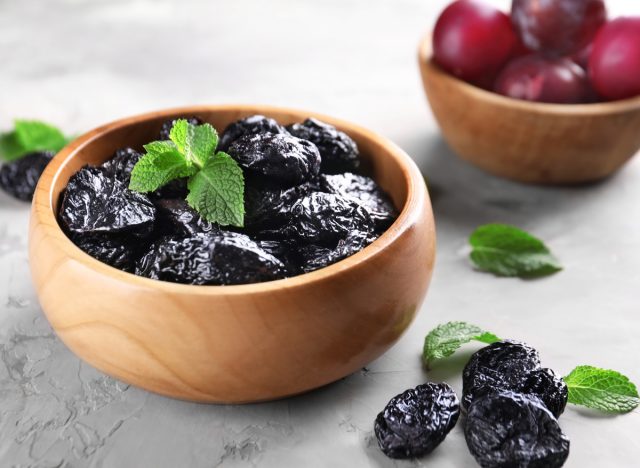
“If you’re looking to start your day off by promoting regularity and preventing constipation, prunes are your ticket,” says Tammy Lakatos Shames, RDN, CDN, CFT, and Lyssie Lakatos, RDN, CDN, CFT, also known as The Nutrition Twins. Prunes are versatile; you can add them to your oatmeal, cold cereal, or pancakes. According to The Nutrition Twins, scientists aren’t entirely sure how prunes work their magic. However, the dietitians believe it’s a combination of the prebiotic fiber, antioxidants, and sorbitol—a sugar alcohol that the body metabolizes slowly. The prebiotic fiber will positively affect the bacteria in your gut by providing food for the beneficial probiotic bacteria and lowering the risk of colon cancer.
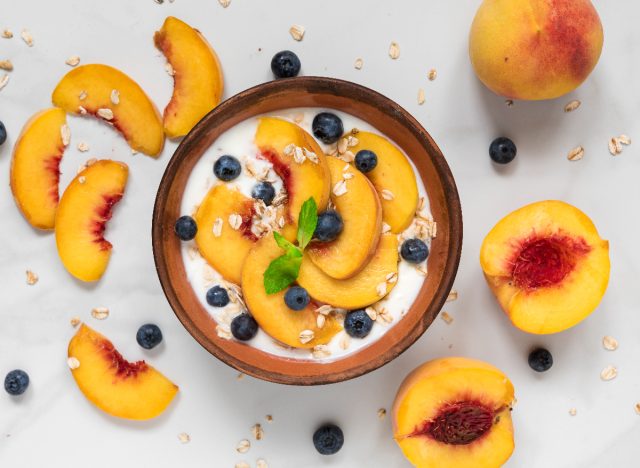
This natural sugar source makes for a deliciously sweet addition to your breakfast. Add peaches to your morning yogurt, top them on a stack of pancakes or waffles, or use them as a low-sugar preserve on toast for insoluble fiber—a dietary fiber that attracts water into your stool.
“Insoluble fiber adds bulk, softness, and acts as a gentle laxative effect to improve bowel regularity,” says Hembree.
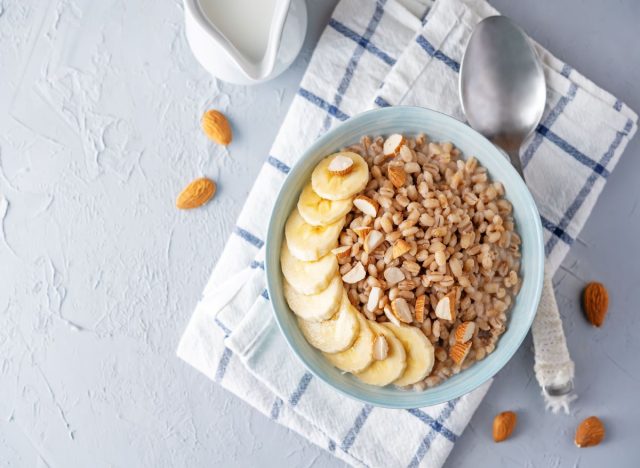
We know that popular whole grains like oatmeal and whole wheat make great breakfast choices. However, there are plenty more options to choose from, so you don’t have to always rely on the same foods.
“Whole grains like oatmeal and whole wheat are great, but expand your horizons to others like barley, sorghum, and whole rye since their fiber contains the non-digestible carb, beta-glucan, too,” say the Nutrition Twins.
These good-for-you carbs improve gut health and promote the growth of gut-friendly bacteria like lactobacilli, Bifidobacteria, and Bacteroidetes. To make the breakfast even better for your gut, slice a slightly green banana on top, since bananas are a good source of prebiotic fiber—especially if you eat them before they’ve ripened.

Beans might not be seen as your typical breakfast food, but they make for a great, gut-healthy choice to start the day.
“Beans are a mostly soluble fiber, which is slowly digested to increase feelings of fullness,” says Hembree.
You can get creative with beans, as they’re super easy to cook and throw in any dish. For example, throw black beans in your breakfast hash, blend some cannellini beans into a bread spread, or blend some Great Northern beans to make a fruit smoothie more creamy. You could also toss them into a black bean omelet.
Get our recipe for a Vegetarian Black Bean Omelet.

Starting your morning breakfast routine with a large glass of lemon water can help guide the digestion process, according to the Nutrition Twins.
“The combination of the water and the acid in the lemon aids digestion by helping to break down food so that your body can absorb nutrients, while also softening stool so the digestive tract can start the day fresh by eliminating wastes and toxins from the intestines,” say the Nutrition Twins.
Lemons also contain potent polyphenols—micronutrients that protect the body’s tissues against oxidative stress and associated pathologies such as cancers, coronary heart disease, and inflammation. This also seems to protect the microbiome against the ill effects of aging.
The Nutrition Twins recommend scooping some of the insides of the lemon in your water as well since that’s where the pectin can be found. Pectin is a fiber that stimulates a healthy microbiome and promotes the growth of probiotics like Bifidobacterium.
A previous version of this article was published on April 7, 2022. It has been updated to include additional information, proofreading revisions, and updated contextual links.
